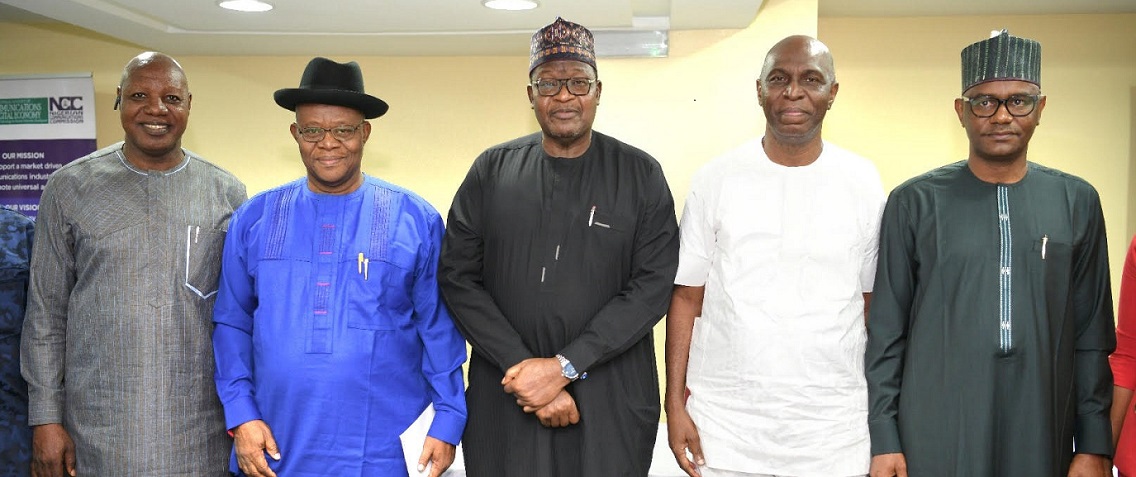Telecom
Telecoms Investment in Nigeria now $75.6bn, Danbatta declares

Prof. Umar Garba Danbatta, Executive Vice Chairman (EVC) of the Nigerian Communications Commission (NCC), has officially announced that the investment profile in the nation’s telecommunications sector, comprising foreign direct investment (FDI) and local investment, has reached $75.6 billion as of 2021.

L-R: Mustapha Isa, Former President, Nigerian Guild of Editors (NGE); Ochereome Nnanna, Chairman, Editorial Board, Vanguard Newspapers; Prof. Umar Danbatta, Executive Vice Chairman/Chief Executive Officer, Nigerian Communications Commission (NCC); Sam Omatseye, Chairman, Editorial Board, The Nation Newspapers and Usman Malah, Director, Human Capital and Administration, NCC at a media roundtable organised by the Commission in Lagos on Wednesday (July 5, 2023).
Danbatta disclosed this at an interactive session with stakeholders in the communications media ecosystem, in Lagos on Wednesday where he provided his scorecards and landmark developments that have shaped the trajectory of growth in the telecoms sector since he became the chief telecom regulator in August 2015.
According to Danbatta, in 2018, investment profile in the sector stood at $68 billion. This increased to $70.5 billion in 2019 and $72 billion in 2020. At the end of 2021, the figure rose to $75,560,563,417.79 ($75.6 billion). The latest figure is the current official investment profile computed in the industry up from the initial $70 billion investment in the last few years.
Investment in the telecommunications sector in Nigeria is computed from two sources: the Central Bank of Nigeria (CBN), and the financial data obtained from service providers by the Commission.
While the CBN collects and calculates an element of the telecoms sector to include FDI, portfolio and others, the Commission collects investment figures from telecom licensees described as domestic investment arising from capital expenditure (CAPEX) which form part of the total investment in the industry.
The NCC CEO said through effective regulatory environment put in place by the Commission, the telecom sector has recorded tremendous growth from an initial investment profile of $500 million as at 2001, when the sector was fully liberalised.
Similarly, Danbatta said the telecom sector has continued to be a major contributor to the Nigeria’s economy through an impressive the sectoral contribution to the nation’s Gross Domestic Product (GDP) quarterly, up from about 8.5 per cent in third quarter of 2015, contributing N10.126 trillion to the nation’s GDP in 2022 alone.
Citing data from the National Bureau of Statistics (NBS), Danbatta said the telecoms sector contributed N10.126 trillion as an aggregate quarterly contribution to GDP in 2022.
“In the first quarter, the sector contributed 12.94 per cent equivalent to N2.246 trillion while the second quarter witnessed an all-time high GDP contribution by the telecom sector to the nation’s economy, standing at 15 per cent and valued at N2.593 trillion. The sector’s contribution to GDP in the third was 12.85 per cent and in the fourth quarter, it grew to 13.55 per cent, which are valued at N2.436 trillion and N2.851 trillion respectively.
“The growth trajectory continued this year as telecommunications and Information Services sector in Nigeria delivered a handsome N2. 508 trillion in terms of financial value contribution to the nation’s gross domestic product, GDP, representing 14.13% in the first quarter 2023,”he said.
Telecoms contribution to national GDP has grown significantly since assumption of Prof. Danbatta as the EVC of NCC in August, 2015, according to available data from NBS.
From 8.50 per cent in 2015, it grew to 9.13 per cent in 2016 and to 8.66 per cent in 2017. In the last quarter of 2018, telecoms contributed 9.85 per cent to national GDP while it added 10.60 per cent in the fourth quarter of 2019.
Also in the second quarter of 2010, it added 14.30 per cent to GDP; 14.42 per cent in the second quarter of 2021. The highest quarterly contribution to GDP by the sector to the economy was 15 per cent in the second quarter of 2022.
Overall, Danbatta said the sector has become a major enabler of economic development in Nigeria, as it continues to positively impact all the facets of the Nigerian economy. “As the regulatory authority for the telecom sector in Nigeria, we are happy that the sector has recorded phenomenal growth statistics in the past two decades of the liberalization of the telecoms sector. However, we will not rest on our oars. We will continue to push upward to greater heights by encouraging expansion of frontiers to put Nigeria’s imprint on the global map of digital economy,” he said.
In addition to the growth in investment and GDP contribution, Danbatta said, “As of May, 2023, active voice subscriptions reached 221.3 million, equivalent of 115.91 per cent teledensity, while Internet subscriptions rose to 159.6 million.
According to the CEO of NCC, broadband subscriptions on Third Generation (3G) and Fourth Generation (4G) networks increased to 92.2 million, representing a 48.28 per cent broadband penetration in the country.
Also, following the issuance of 3.5GHz spectrum licences for the deployment of Fifth Generation (5G) networks in Nigeria, marked by ultra-high speed internet, low latency and high capacity, and the subsequent commercial launch by two of the three licence holders, 5G subscriptions have grown to over 60,000 in many cities in at least 12 states of the Federation.
Danbatta assured of the Commission’s commitment to always give concrete expression to the Federal Government Executive Order 001 focused on Ease of Doing Business and other digital economy-oriented policies, by embarking on various regulatory initiatives that support a friendly investment climate for investors in Nigeria and enhance value for money for telecom consumers.
The EVC particularly commended the media as a strategic partner and enabler of growth in the telecom sector “through accurate, adequate and timely reporting of all regulatory activities of the Commission.”
Telecom
Glo Rolls Out ‘Take a Guess,’ Bringing Fun and Big Wins This Season

In the true spirit of the festive season, Globacom has introduced “Glo Take a Guess,” a new value-added service designed to entertain, engage, and reward subscribers across Nigeria.

The interactive trivia game lets customers test their knowledge of everyday topics and lifestyle trends for a chance to win airtime, data, and exciting cash prizes.
According to Globacom, subscribers can join the fun by dialing 209992# and choosing from daily, weekly, or monthly plans. Once subscribed, they’ll receive an SMS confirmation with a link to play.
“Participants stand a chance to win fantastic rewards, including airtime, data, and cash prizes, when they answer trivia questions correctly,” the company explained. “It’s a fun and rewarding experience for everyone.”
Subscription costs ₦100 per day, ₦300 per week, or ₦500 per month — with corresponding rewards of ₦10,000 daily, ₦100,000 weekly, and up to ₦1 million monthly. The more subscribers play, the greater their chances of winning.
Globacom added that “Glo Take a Guess” is more than just a game — it’s a lighthearted way to stay entertained and earn rewards while easing the pressures of rising living costs.
Telecom
MTN mPulse Spelling Bee Crowns Seven Regional Champions in Enugu

It was a display of brilliance and composure as young Nigerians, aged 9 to 15, showcased their spelling prowess in the Enugu regional final of the MTN mPulse Spelling Bee on Saturday, November 1, 2025, held at the International Conference Centre, Enugu. After an electrifying one-hour showdown among 20 contestants, seven young spellers earned the right to compete in the grand finale in Lagos.

These excited champions, Nelson Ede Chidubem, Praise Ihionu, Emeka Nwaokocha Samuel, Treasure Oyibosu, Michelle Atanu Ufedo, Munachimso Onyemaechi, and Oyingba Douglas-Naingba, have been presented with their tags for the grand finale and will advance to Lagos, where they will join other regional winners to contend for the national title.
As part of the event, gift vouchers were presented to children and parents through questions and answers, adding a festive touch to the competition.
In his remarks, Honourable Emeka Nelson Nwagbo, Senior Special Adviser on Youth Mobilisation, Enugu West, said, “This initiative has not only encouraged academic excellence but also inspired our young leaders to pursue knowledge with confidence and pride. To the organisers, teachers, parents, and participants, thank you for making this event a success. Your dedication and support have truly made today memorable.
Once again, we say a big thank you to MTN Nigeria. We are happy that the brand is working in line with the vision of the Governor concerning smart schools. We look forward to more collaborations that will continue to empower our kids and youths,” he concluded.
Honourable Paul Ogbewe Okechukwu, Senior Special Adviser to the Governor on Youth Mobilisation, Enugu East, also commended MTN for fostering literacy and healthy competition among teens, and for hosting the first physical regional finals in Enugu.
Addressing the participants, Temilolu Salako, Senior Manager, Segment Marketing, Youth, Women, & Teen, MTN Nigeria, said, “At MTN, we believe in the power of connectivity and technology to transform lives and build a brighter future for everyone. My team and I are here to inspire, support, and guide you on your journey to success. Together, we can achieve great things and make a lasting impact.”
With the seven winners from the Enugu regional final now advancing to the grand finale in Lagos, attention shifts to the next rounds of the MTN mPulse Spelling Bee regional finals, scheduled to hold in Abuja on November 8 and Ibadan on November 15, 2025.
Telecom
Glo Unveils “Play Up” Lottery for Nigerians to Win Millions in Prizes

Telecommunications giant, Globacom, has launched an exciting new lottery service — Glo Play Up — designed to blend fun, anticipation, and the prospect of life-changing rewards for its subscribers.

Glo Play Up offers Nigerians a simple yet thrilling opportunity to turn small predictions into multi-million-naira wins. The game invites subscribers to pick a lucky number between 1 and 9 for a chance to strike gold.
To participate, Glo customers simply dial *400# or send their chosen number via SMS to 400. Each entry costs just ₦100, and players can either subscribe daily or play on demand — whenever inspiration strikes.
In a statement issued in Lagos, Globacom described the initiative as more than just a game of chance, but a celebration of hope and possibility.
“We understand the optimism and adventurous spirit of Nigerians,” the company explained. “People love to dream, play, and believe in the power of that one big win. Glo Play Up makes that dream more attainable — it’s easy to play, affordable, and truly rewarding.”
Every Friday at 4 p.m., a weekly draw will take place at Glo’s Head Office, where ten lucky subscribers will each receive ₦1 million. In addition, a grand prize winner will be announced monthly, walking away with an impressive ₦10 million. Winners will be hosted at their nearest Glo Regional Office, and all cash prizes will be credited directly into their MoneyMaster Wallet accounts.
With Glo Play Up, entertainment meets empowerment — reinforcing Globacom’s commitment to innovation, connection, and customer delight. The service not only promises excitement but also the possibility of transforming lives through rewarding experiences.
For more information, visit https://www.gloworld.com/ng/glo-play-up-lottery

 Broadcasting2 days ago
Broadcasting2 days agoOluwaseun Dania Unearths How AI will Shape Africa’s Creative-AI Future @ World Bank Forum

 E-Financial1 day ago
E-Financial1 day agoFlutterwave CEO @ CNN Global Perspectives Summit, Envisions Building Africa’s ‘Payment Superhighway’

 E-Business2 days ago
E-Business2 days agoBlack Friday: How Konga Yakata is Defying Global Inflation

 News2 days ago
News2 days agoTax Ombudsman is to Protect Businesses from Harassment—Oyedele

 News2 days ago
News2 days agoLassa Fever’s Death Toll in Nigeria Hits 176- NCDC

 News2 days ago
News2 days agoFG Okays Biometric Upgrades @ Airports, Others

 Telecom2 days ago
Telecom2 days agoGlo Rolls Out ‘Take a Guess,’ Bringing Fun and Big Wins This Season

 E-Financial2 days ago
E-Financial2 days agoSEC Tasks Registrars, Other CMOs on Innovations


























